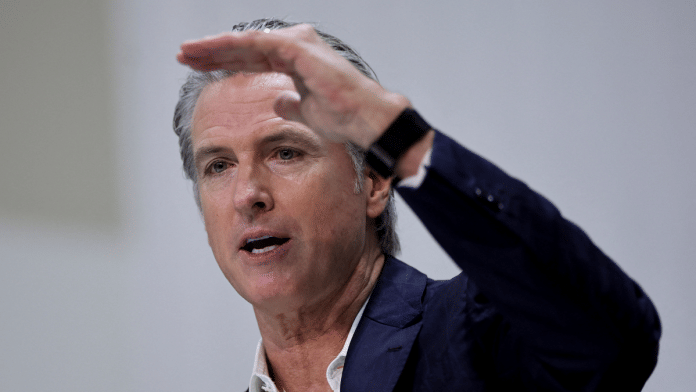New Delhi: California Governor Gavin Newsom blasted Donald Trump as “an invasive species” at COP30, as the US President skipped the ongoing annual climate conference in Brazil’s Belem.
As co-founder of America All In, a coalition of city and state leaders committed to climate change mitigation, Newsom attended pavilion events, press conferences and interviews at Belem, where he spoke about the US President’s withdrawal from the Paris Agreement, among other things.
“He (Trump) is an invasive species and a wrecking ball president who wants to roll back all the progress we’ve made in the last century,” Newsom said Tuesday in a conversation with Costa Rican diplomat Christiana Figueres.
On the second day of the United Nations Framework Convention on Climate Change (UNFCCC)’s 30th Conference of the Parties (COP30), Newsom and a group of 100 local American leaders and politicians attended the event as the America Is All In alliance. Their presence was significant, given the US’ position as the largest historical contributor to greenhouse gas emissions, and the recent actions of Trump calling climate change a ‘con job’.
Gina McCarthy, former US climate advisor, and Michelle Lujan Grisham, Governor of New Mexico, also attended COP30.
“Governor Newsom’s presence at COP-30 is very much in tradition — a statement that parts of America remain engaged even when Washington isn’t…even during Trump’s first term, when the US stepped back from global climate leadership, state and local governments stepped forward to fill the void,” said Milan Vaishnav, Director and Senior Fellow, Carnegie South Asia Program.
The US pulled out of the Paris Agreement and from the World Health Organisation in January after President Trump signed an executive order mandating the withdrawal. Calling climate change “a hoax”, Trump decided to focus his government on pulling out of international climate deals, reducing investments in clean energy, and expanding oil and gas and other fossil fuel projects.
However, as Vaishnav and as other experts have observed in the US over the past months, Trump’s policies have not received support from all states.
When asked about Trump’s plan to open up the California coastline to oil and gas drilling, Newsom had one thing to say—“over our dead body. It will never happen.”
Newsom and other US local and state-level leaders’ presence at COP30, despite the US not sending a formal delegation, was to ensure that all US states are not seen in the same light as the federal government.
We’re in Brazil — one of the world’s great democracies, one of our biggest trading partners — and not a single person from the Trump Administration showed up.
That’s shameful. pic.twitter.com/1VSF2Kevv5
— Governor Gavin Newsom (@CAgovernor) November 10, 2025
Through his speeches and press conferences, Newsom ensured that he showed California’s support for climate mitigation and his disagreement with Trump’s policies.
“I don’t want the US to become a footnote in this climate conference,” said Newsom at a press conference with the Brazilian presidency. “Trump’s presidency is temporary, but California is a stable, reliable partner for low-carbon, green growth.”
Also Read: Brazil’s $125 bn forest fund takes root at COP30; promises incentives as money doesn’t grow on trees
What Newsom’s presence means
Newsom, who has served as the governor of California since 2019, is a significant political leader in the Democrat party and the US in general. California is the world’s fourth-largest economy, and has been expanding sustainable technologies, investing more than $100 million in renewable energy in 2025.
More importantly, though, Newsom’s presence at COP30 indicates a political shift.
“Gavin Newsom is almost certain to run for the presidential primaries in 2026 and will be one of the leading contenders from the Democratic Party,” said Ashutosh Varshney, Professor of Political Science at Brown University. “His presence at COP30 indicates the rupture through the middle of America—it is now two Americas.”
Newsom did not just bat for California and individual US states, though. Despite not directly representing the US government, he spoke about the international challenges and competitors for the US, and how President Trump failed to recognise it.
“One of the great abdications… is the own goal of a US president who simply doesn’t understand how enthusiastic [Chinese President] Xi is that the US is nowhere to be found at COP30 today,” said Newsom at a press conference. “They’re very happy dominating supply chains and manufacturing, because they understand the economic opportunity of green energy transition.”
California, he said, would not give in to the Chinese dominance and would fight back. He urged other countries to look at the US as a bottom-up country, instead of just looking at Trump’s actions at the federal level. His actions as the Governor of California were examples of how states and city governments in the US were attempting to bypass the Trump government’s disavowal of clean energy and climate mitigation policies, he asserted.
In March, Newsom signed an agreement with the Mexican state of Sonora to advance clean air and environmental goals in California, while in February, it entered into a partnership with 21 Brazilian states to cut pollution through transport and energy.
Even at COP30, Newsom’s participation reflected a shift towards local governance and city and state-level climate commitments in the US, with the California Governor going so far as saying that the federal government’s climate decisions are temporary.
“Any Democrat President would rejoin the Paris Agreement with no hesitation,” he said in the press release.
However, experts still realise the limits of local governance in the US, especially when it comes to subjects like climate change and diplomacy.
“This patchwork approach (to climate diplomacy) comes at a cost,” said Vaishnav. “The US federal government remains the single most important actor. Without the full weight of federal engagement, the world loses a central driver of collective ambition.”
(Edited by Tony Rai)
Also Read: Who will fill the US gap at COP30? It could be China’s moment to shine






